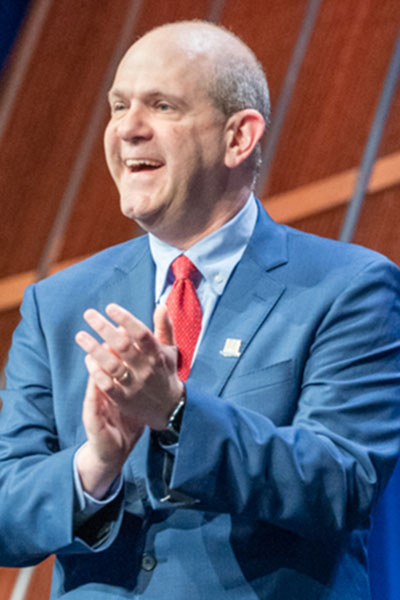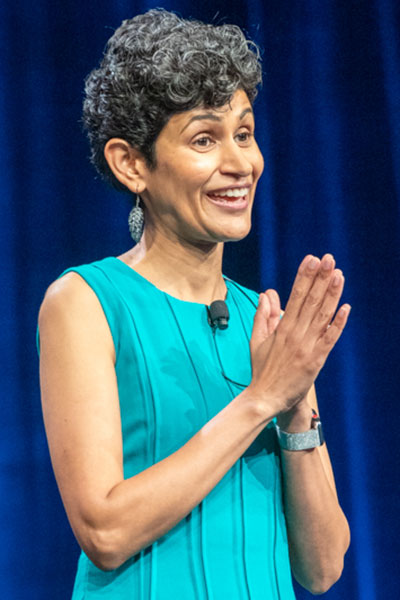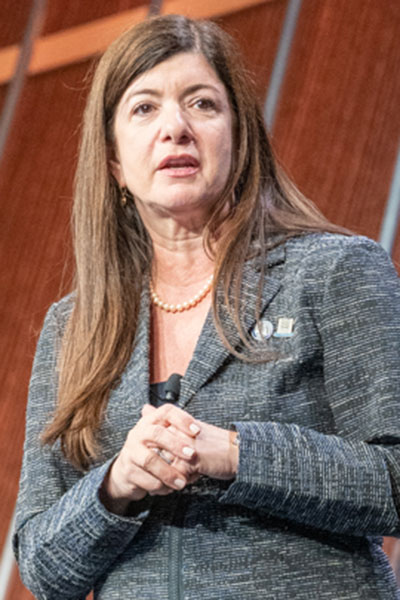Being happy is no accident. It’s an art. And like any art, the more you practice, the better you get.
“We have happiness backwards,” said Neil Pasricha, best-selling author on gratitude, happiness, failure, resilience, connection, and trust. “We’re taught, we believe, that if you do great work, you get rewarded and you will be happy. This model is reversed. If you show up to work happy, you are 40% more likely to get a promotion in the next 12 months and are 300% more creative. And happy people live longer. Happiness is a habit, a practice, an investment in yourself. And you can do it in just 2 minutes a day.”
Pasricha delivered the keynote address, “The Art of Happiness,” during the CHEST 2022 Opening Session on Sunday to help set the tone for the first in-person CHEST Annual Meeting since the COVID-19 pandemic.
Humans want happiness more than anything else. Start typing “How to be…” on Google and “happy” is the top search term that completes the phrase. But while incomes, education levels, and other measures of success have soared since the 1950s, repeated surveys suggest that happiness levels have not budged.
Pasricha outlined two practices, one for the morning, one for the evening, that have been shown to increase happiness in multiple studies. Both start with a simple step: put your cell phone in another room.
“About 95% of people say they wake up with their phone within 5 feet,” he explained. “We are phoneaholics. Our cell phones are getting in the way of happiness. You are always a loser on the internet, always comparing yourself to a manipulated ideal that is impossible to reach. Get your phone out of the bedroom!”
The morning practice has three steps. Start each day by writing down three things.
- I will let go of…
- I am grateful for…
- I will focus on…
The evening alternative is even simpler.
- Turn your cell phone off 2 hours before going to bed.
- Read two pages from a physical book of fiction.
Change does not come from thinking about reasons to do something differently, including being happy, Pasricha said. Change comes from doing something differently.
“It is easier to act yourself into a new way of thinking than to think yourself into a new way of acting,” he emphasized. “Happiness is a practice that can change the way you approach to everything. These 2 minutes are a thing you can do, simply and easily, that can change your life.”

The practice of happiness has been an important focus for CHEST President, David Schulman, MD, MPH, FCCP, in the wake of hardships and isolation caused by the COVID-19 pandemic.
“We’ve been through a lot over the last few years, and one thing that’s been in the forefront of my mind is the effort to recapture joy. How to find the little things in life that keep us going, find the wins in each and every day,” Dr. Schulman said while introducing Pasricha.
The Opening Session, which included on-stage award presentations and special appearances by recent CHEST presidents and scientific program committee chairs, celebrated the positive energy that comes from gathering again in person.

“We have put so much love into the meeting, both literally and figuratively,” CHEST 2022 Scientific Program Committee Chair, Subani Chandra, MD, FCCP, said. “I am very excited to share with you where to find all the cool stuff at CHEST 2022, and, of course, where to have fun. No one does education better than CHEST, and no one brings entertainment to a meeting better than CHEST. Put the two together and there is magic in Nashville!”

To close her speech, CHEST President-Elect, Doreen J. Addrizzo-Harris, MD, FCCP, offered advice—and a call to action—to all members to bring the spirit of positivity and collaboration present throughout the annual meeting into 2023 and beyond.
“I ask that each and every one of you get involved – if you already are, thank you!” she said. “If you’re still finding your place within CHEST or aren’t sure where to start, please reach out. All of the CHEST leaders are very accessible, and we can connect you with the right people to get you engaged.”
Join us at CHEST 2024
Connect in person with influential clinicians from around the world—and attend top-tier educational sessions focusing on the most relevant clinical topics. CHEST 2024 will have it all, including optional add-on sessions to customize your learning. Reserve your spot today, and save $100 when you register by September 22.





